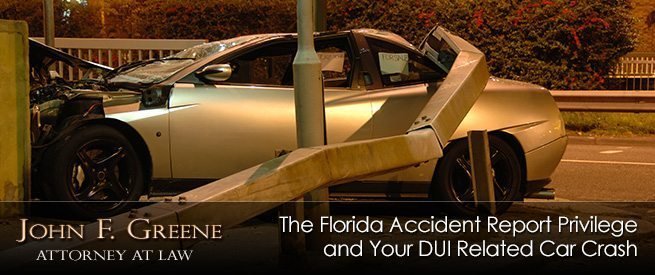
If you are in a car crash that involves injury or extensive damage, it is your legal responsibility to report the incident to the police. As a Florida driver, however, you also receive significant incentive to fulfill this duty: the state maintains an accident report privilege policy that could prove extremely helpful if you might otherwise be suspected of committing a crime.
Unfortunately, while Florida’s accident report protocol holds clear benefits for local drivers, it can also be incredibly confusing — and exceptions apply. The more you know, the less likely you are to suffer self-incrimination. Below, we clarify the role of the accident report privilege in Florida crashes and its potential impact on DUI cases.
What Is Florida’s Accident Report Privilege? How Does It Work?
Florida’s accident report privilege stems, in part, from local police officers’ need to file detailed reports on all car crashes. To successfully file these reports, officers must obtain detailed information about each incident, including the names of the drivers, the vehicles involved in the crash, and whether the drivers held car insurance at the time of the accident. Those providing this information may be forced to also offer up incriminating information, which, without the accident report privilege, would increase their risk of arrest — and leave them reluctant to report critical information in the first place.
With the accident report privilege in place, drivers can avoid having information shared in reports also repeated in ensuing criminal and civil cases. Specifically, Section 316.066(1)(a) of the Florida Statutes maintains that crashes reported by involved parties “shall be without prejudice to the individual so reporting. Such report or statement may not be used as evidence in any trial, civil or criminal.”
How Does the Florida Accident Report Privilege Apply to DUI Car Crashes?
While the accident report privilege provides valuable legal protection for Florida drivers, its scope may prove surprisingly limited in DUI cases. After all, the privilege only extends to statements made by those involved in the crash. Other common evidence — such as blood alcohol content — can be used to demonstrate that the driver believed responsible for the crash was intoxicated at the time of the incident. Furthermore, eyewitness statements are not deemed privileged information, unless the eyewitness is believed to be at least partially responsible for the crash.
Another factor worth considering: Florida’s accident report privilege only applies to statements that might be deemed incriminating based on the Fifth Amendment of the United States Constitution. Simple statements of fact (such as the time at which the accident occurred) are not considered incriminating, so they remain admissible in court.
Unfortunately, post-accident statements are not quite as privileged as Florida drivers would like to think. When in doubt, seek assistance from a criminal defense attorney. Your lawyer can help you avoid accidental self-incrimination.
If you have been accused of driving under the influence or committing another crime in the Destin area, it is imperative that you seek quality council as soon as possible. Attorney John F. Green is a wonderful resource to have in your corner. He boasts an impressive track record in criminal law — and the determination to see your case through to a desirable resolution. You will appreciate not only his extensive legal knowledge, but also the compassionate approach he employs. To learn more, contact him online or call 850-424-6833 today.










